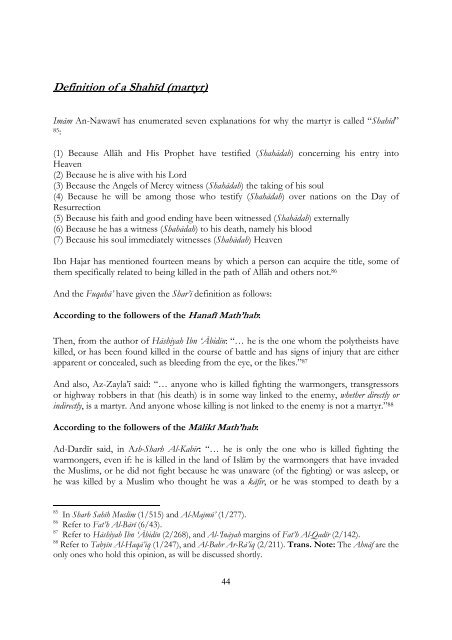the-islamic-ruling-on-the-permissibility-of-self-sacrificial-operations-suicide-or-martyrdom
the-islamic-ruling-on-the-permissibility-of-self-sacrificial-operations-suicide-or-martyrdom
the-islamic-ruling-on-the-permissibility-of-self-sacrificial-operations-suicide-or-martyrdom
Create successful ePaper yourself
Turn your PDF publications into a flip-book with our unique Google optimized e-Paper software.
Definiti<strong>on</strong> <strong>of</strong> a Shahīd (martyr)<br />
Imām An-Nawawī has enumerated seven explanati<strong>on</strong>s f<strong>or</strong> why <str<strong>on</strong>g>the</str<strong>on</strong>g> martyr is called “Shahīd”<br />
85:<br />
(1) Because Allāh and His Prophet have testified (Shahādah) c<strong>on</strong>cerning his entry into<br />
Heaven<br />
(2) Because he is alive with his L<strong>or</strong>d<br />
(3) Because <str<strong>on</strong>g>the</str<strong>on</strong>g> Angels <strong>of</strong> Mercy witness (Shahādah) <str<strong>on</strong>g>the</str<strong>on</strong>g> taking <strong>of</strong> his soul<br />
(4) Because he will be am<strong>on</strong>g those who testify (Shahādah) over nati<strong>on</strong>s <strong>on</strong> <str<strong>on</strong>g>the</str<strong>on</strong>g> Day <strong>of</strong><br />
Resurrecti<strong>on</strong><br />
(5) Because his faith and good ending have been witnessed (Shahādah) externally<br />
(6) Because he has a witness (Shahādah) to his death, namely his blood<br />
(7) Because his soul immediately witnesses (Shahādah) Heaven<br />
Ibn Hajar has menti<strong>on</strong>ed fourteen means by which a pers<strong>on</strong> can acquire <str<strong>on</strong>g>the</str<strong>on</strong>g> title, some <strong>of</strong><br />
<str<strong>on</strong>g>the</str<strong>on</strong>g>m specifically related to being killed in <str<strong>on</strong>g>the</str<strong>on</strong>g> path <strong>of</strong> Allāh and o<str<strong>on</strong>g>the</str<strong>on</strong>g>rs not. 86<br />
And <str<strong>on</strong>g>the</str<strong>on</strong>g> Fuqahā’ have given <str<strong>on</strong>g>the</str<strong>on</strong>g> Shar’ī definiti<strong>on</strong> as follows:<br />
Acc<strong>or</strong>ding to <str<strong>on</strong>g>the</str<strong>on</strong>g> followers <strong>of</strong> <str<strong>on</strong>g>the</str<strong>on</strong>g> Hanafī Math’hab:<br />
Then, from <str<strong>on</strong>g>the</str<strong>on</strong>g> auth<strong>or</strong> <strong>of</strong> Hāshiyah Ibn ‘Ābidīn: “… he is <str<strong>on</strong>g>the</str<strong>on</strong>g> <strong>on</strong>e whom <str<strong>on</strong>g>the</str<strong>on</strong>g> poly<str<strong>on</strong>g>the</str<strong>on</strong>g>ists have<br />
killed, <strong>or</strong> has been found killed in <str<strong>on</strong>g>the</str<strong>on</strong>g> course <strong>of</strong> battle and has signs <strong>of</strong> injury that are ei<str<strong>on</strong>g>the</str<strong>on</strong>g>r<br />
apparent <strong>or</strong> c<strong>on</strong>cealed, such as bleeding from <str<strong>on</strong>g>the</str<strong>on</strong>g> eye, <strong>or</strong> <str<strong>on</strong>g>the</str<strong>on</strong>g> likes.” 87<br />
And also, Az-Zayla’ī said: “… any<strong>on</strong>e who is killed fighting <str<strong>on</strong>g>the</str<strong>on</strong>g> warm<strong>on</strong>gers, transgress<strong>or</strong>s<br />
<strong>or</strong> highway robbers in that (his death) is in some way linked to <str<strong>on</strong>g>the</str<strong>on</strong>g> enemy, whe<str<strong>on</strong>g>the</str<strong>on</strong>g>r directly <strong>or</strong><br />
indirectly, is a martyr. And any<strong>on</strong>e whose killing is not linked to <str<strong>on</strong>g>the</str<strong>on</strong>g> enemy is not a martyr.” 88<br />
Acc<strong>or</strong>ding to <str<strong>on</strong>g>the</str<strong>on</strong>g> followers <strong>of</strong> <str<strong>on</strong>g>the</str<strong>on</strong>g> Mālikī Math’hab:<br />
Ad-Dardīr said, in Ash-Sharh Al-Kabīr: “… he is <strong>on</strong>ly <str<strong>on</strong>g>the</str<strong>on</strong>g> <strong>on</strong>e who is killed fighting <str<strong>on</strong>g>the</str<strong>on</strong>g><br />
warm<strong>on</strong>gers, even if: he is killed in <str<strong>on</strong>g>the</str<strong>on</strong>g> land <strong>of</strong> Islām by <str<strong>on</strong>g>the</str<strong>on</strong>g> warm<strong>on</strong>gers that have invaded<br />
<str<strong>on</strong>g>the</str<strong>on</strong>g> Muslims, <strong>or</strong> he did not fight because he was unaware (<strong>of</strong> <str<strong>on</strong>g>the</str<strong>on</strong>g> fighting) <strong>or</strong> was asleep, <strong>or</strong><br />
he was killed by a Muslim who thought he was a kāfir, <strong>or</strong> he was stomped to death by a<br />
85 In Sharh Sahīh Muslim (1/515) and Al-Majmū’ (1/277).<br />
86 Refer to Fat’h Al-Bārī (6/43).<br />
87 Refer to Hāshiyah Ibn ‘Ābidīn (2/268), and Al-‘Ināyah margins <strong>of</strong> Fat’h Al-Qadīr (2/142).<br />
88 Refer to Tabyīn Al-Haqā’iq (1/247), and Al-Bahr Ar-Rā’iq (2/211). Trans. Note: The Ahnāf are <str<strong>on</strong>g>the</str<strong>on</strong>g><br />
<strong>on</strong>ly <strong>on</strong>es who hold this opini<strong>on</strong>, as will be discussed sh<strong>or</strong>tly.<br />
44


